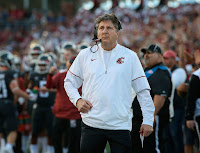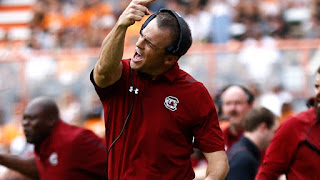How Mike Leach, Jim McEllwain and "Rocky" can teach us about the NCAA coaching carousel
The Southeastern Conference is seeing a major upgrade in coaching this offseason, specifically in the Western division.
On January 9 it was reported Mike Leach was leaving Washington State for Mississippi State, ending an eight-year run in Pullman with a 55-47 record. Factor in his work at Texas Tech and making that program relevant from 2000-2009, and leadership in Starkville made a great hire.
Leach highlights a bevy of coaching moves, joining new Ole Miss head coach Lane Kiffin (another good hire) and Arkansas' Sam Pittman (a questionable hire). Pittman's hire does look a little better with the addition of Kendal Briles as offensive coordinator, and Auburn adding Chad Morris as its offensive coordinator.
On paper the SEC West looks loaded with some strong offensive minds joining the two powerhouses of Alabama and LSU.
It also came out that Washington State may not be looking too long, and rumors are Central Michigan head coach Jim McElwain is the favorite there. McElwain would be a good hire, not great.
While he has shown success at Colorado State, where he went 22-15 in three seasons, and gone 8-6 his first year at CMU, his time at Florida didn't go well. While he went 22-12 in three years, his final year was marred by three wins.
Whether he can find sustained success at the Power 5 level is yet to be proven.
But this one day of news goes back to one aspect that continues to dog the NCAA in regard to its hiring of head coaches. Why can't black and minority coaches have a hard time getting head coaching jobs.
(And who better to tell you about this problem than me, a white person. Now where is that sarcasm emoji?)
538 did interesting research compiling data in December 2019 on minority head coaches you can read on here.
Currently, there 14 black head coaches, with seven at Power 5 programs. Out of 130 programs. That is just shy of 11 percent. Compare that to 52 percent of players in college football who are minority.
LINK: Composite list of black coaches in college football, and how they did in 2019
Now before we go too deep. No question, things have improved from the days where minorities could not coach at all to now. Also, not every minority assistant coach wants to be a head coach, and the same goes for white assistant coaches.
That sentiment can also go to coaches at Division II and III. Some are happy at that level, and more power to them.
The most telling state from 538 is this.
There is also the perception minority coaches make finalists lists, but are really only there to make it look like schools gave them a chance.
On the flip side, perception may not match with reality. We as the public only know the names in coaching searches either through "leaks" or through the work of intrepid journalists.
And one or two coaching searches are not indicative of the nationwide, or in this case NCAA Division I-wide, idea that unknown or minority coaches don't get a fair look.
But, every year there is a coaching carousel, and seemingly every year, the same names are getting fired one year, then rehired the next. It does fit the comeback narrative, though, that we eat up in this country.
I guess you can thank Sylvester Stallone and his "Rocky" franchise for that...at least the first, third and fourth one at least.
Who doesn't love the story of a guy getting knocked down, in this case losing a Power 5 job, only to go back to a "Rest of 5" school to rebuild his brand, and then get another shot at the big times?
Here is the thing. Those guys aren't the underdogs once they get knocked down. Those guys are Apollo Creed, and there are no movies about him.
Sidenote: The movies about his son are worth a watch though.
From a business standpoint, which athletic departments are despite their non-profit status, it is smart to go with a proven name over an unknown. You at least know what you are getting, and for some of those coaches that flamed out at a Power 5 job, they didn't fail from lack of effort.
You need a little bit of luck, such as the right kind of instate players, or you get your conference opponents when they are a little down, or you assemble just the right guys on your staff who are available at the time.
But that same luck coaches need to succeed for whatever reason has not fallen to minority coaches. How else can a guy like Odell Haggins, who has been interim head coach at Florida State twice, not gotten a head coaching gig?
Maybe he likes it at FSU and is happy being an assistant? Or maybe no one has attempted come with an open checkbook for him at a mid major program?
And the solution is not for every school to hire a minority head coach. That does not fix the underlying problem of the same guys keep getting opportunity after opportunity while, as 538 found, minority coaches get the same catchy moniker as highly talented men's basketball players.
One and done.
There may not be a physical barrier barring minority coaches from heading programs. In fact, there is no physical barrier.
Sadly, until a minority coach gets the initial luck to land a Power 5 job, and then succeeds at that job, hiring practices and job searches won't change.
On January 9 it was reported Mike Leach was leaving Washington State for Mississippi State, ending an eight-year run in Pullman with a 55-47 record. Factor in his work at Texas Tech and making that program relevant from 2000-2009, and leadership in Starkville made a great hire.
Leach highlights a bevy of coaching moves, joining new Ole Miss head coach Lane Kiffin (another good hire) and Arkansas' Sam Pittman (a questionable hire). Pittman's hire does look a little better with the addition of Kendal Briles as offensive coordinator, and Auburn adding Chad Morris as its offensive coordinator.
On paper the SEC West looks loaded with some strong offensive minds joining the two powerhouses of Alabama and LSU.
It also came out that Washington State may not be looking too long, and rumors are Central Michigan head coach Jim McElwain is the favorite there. McElwain would be a good hire, not great.
While he has shown success at Colorado State, where he went 22-15 in three seasons, and gone 8-6 his first year at CMU, his time at Florida didn't go well. While he went 22-12 in three years, his final year was marred by three wins.
Whether he can find sustained success at the Power 5 level is yet to be proven.
But this one day of news goes back to one aspect that continues to dog the NCAA in regard to its hiring of head coaches. Why can't black and minority coaches have a hard time getting head coaching jobs.
(And who better to tell you about this problem than me, a white person. Now where is that sarcasm emoji?)
538 did interesting research compiling data in December 2019 on minority head coaches you can read on here.
Currently, there 14 black head coaches, with seven at Power 5 programs. Out of 130 programs. That is just shy of 11 percent. Compare that to 52 percent of players in college football who are minority.
LINK: Composite list of black coaches in college football, and how they did in 2019
Now before we go too deep. No question, things have improved from the days where minorities could not coach at all to now. Also, not every minority assistant coach wants to be a head coach, and the same goes for white assistant coaches.
That sentiment can also go to coaches at Division II and III. Some are happy at that level, and more power to them.
The most telling state from 538 is this.
Since 1975, (there are) only seven instances of an African American head coach being fired and receiving a second opportunity as a head coach.6Compare that to what we see every year with the same coaches seemingly being recycled even after failures, and you get an idea of the real barriers facing minority football coaches.
There is also the perception minority coaches make finalists lists, but are really only there to make it look like schools gave them a chance.
On the flip side, perception may not match with reality. We as the public only know the names in coaching searches either through "leaks" or through the work of intrepid journalists.
And one or two coaching searches are not indicative of the nationwide, or in this case NCAA Division I-wide, idea that unknown or minority coaches don't get a fair look.
But, every year there is a coaching carousel, and seemingly every year, the same names are getting fired one year, then rehired the next. It does fit the comeback narrative, though, that we eat up in this country.
I guess you can thank Sylvester Stallone and his "Rocky" franchise for that...at least the first, third and fourth one at least.
Who doesn't love the story of a guy getting knocked down, in this case losing a Power 5 job, only to go back to a "Rest of 5" school to rebuild his brand, and then get another shot at the big times?
Here is the thing. Those guys aren't the underdogs once they get knocked down. Those guys are Apollo Creed, and there are no movies about him.
Sidenote: The movies about his son are worth a watch though.
From a business standpoint, which athletic departments are despite their non-profit status, it is smart to go with a proven name over an unknown. You at least know what you are getting, and for some of those coaches that flamed out at a Power 5 job, they didn't fail from lack of effort.
You need a little bit of luck, such as the right kind of instate players, or you get your conference opponents when they are a little down, or you assemble just the right guys on your staff who are available at the time.
But that same luck coaches need to succeed for whatever reason has not fallen to minority coaches. How else can a guy like Odell Haggins, who has been interim head coach at Florida State twice, not gotten a head coaching gig?
Maybe he likes it at FSU and is happy being an assistant? Or maybe no one has attempted come with an open checkbook for him at a mid major program?
And the solution is not for every school to hire a minority head coach. That does not fix the underlying problem of the same guys keep getting opportunity after opportunity while, as 538 found, minority coaches get the same catchy moniker as highly talented men's basketball players.
One and done.
There may not be a physical barrier barring minority coaches from heading programs. In fact, there is no physical barrier.
Sadly, until a minority coach gets the initial luck to land a Power 5 job, and then succeeds at that job, hiring practices and job searches won't change.





Comments
Post a Comment